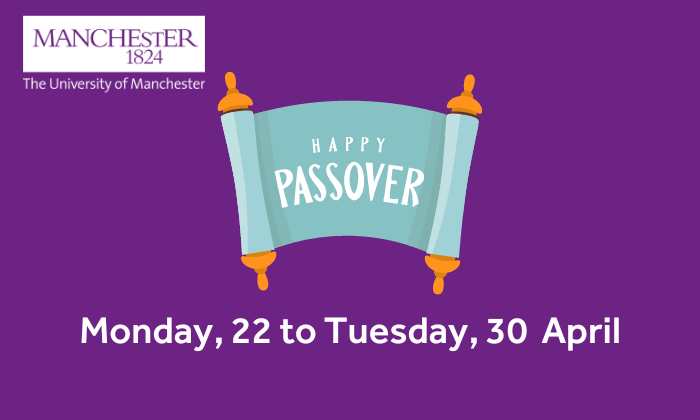Celebrating Passover - supporting colleagues and students
19 Apr 2024
What you need to know about supporting colleagues and students celebrating Passover

We aim to take a holistic approach that celebrates individuals and their many identities to ensure that we are truly inclusive of all our community. This is set out in our Equality, Diversity and Inclusion strategy.
As we approach Passover, we recognise event and its importance to our Jewish community.
What is Passover?
Passover (also called Pesach) is an eight day Jewish festival which is celebrated in early spring and commemorates the emancipation of the Israelites from slavery in Egypt. Pesach is observed by avoiding leaven, and highlighted by the Seder meals that include four cups of wine, eating matzah and bitter herbs, and retelling the story of the Exodus.
In Hebrew it is known as Pesach (which means “to pass over”), because God passed over the Jewish homes when killing the Egyptian firstborn on the very first Passover eve.
When will Passover take place?
In 2024, the dates for Passover are from Tuesday, 22 to Tuesday, 30 April. This year the situation is unique in that Passover falls during term (the last time this occurred was in 2016, the next occurrence after this year will be in 2027). Passover begins on the 15th of the Hebrew month of Nissan. The Jewish year is based on the lunar cycle, therefore the festivals vary from year to year on the solar calendar.
How is Passover celebrated?
Passover is celebrated in two parts. The first two days and the last two days are holidays. Holiday candles are lit at night, kiddush and other holiday meals are enjoyed on both nights and days. On these days, Jewish people don’t go to work, drive, write, or switch on or off electric devices. On the first two nights of Passover, a service called the Seder is held over a meal with family and friends at home. During the meal, the story of the Exodus is told. The middle four days are called Chol Hamoed, semi-festive ‘intermediate days’, when most forms of work are permitted.
How you can support a student or colleague during Passover
- Learn more about Passover - a glossary of terms and useful links will be provided at the end of this Guidance;
- Consider adjustments such as reminding students of the podcasting service for lectures to allow them to watch/listen another time;
- Allow more flexibility where possible for scheduling and bear in mind that Jewish students may not be able to attend meetings, lectures, etc. over the duration of Passover;
- Have a look at the University’s Policy on Religious Observance for students and the Additional Guidance for Teaching and Learning Colleagues to Support Students Wishing to Observe the Jewish Passover Festival.
You can also make colleagues and students aware of the University-wide support available such as:
- The Multi-Faith Chaplains;
- The University of Manchester Jewish Society (JSoc);
- Student wellbeing support;
- Staff wellbeing support;
Find out more
